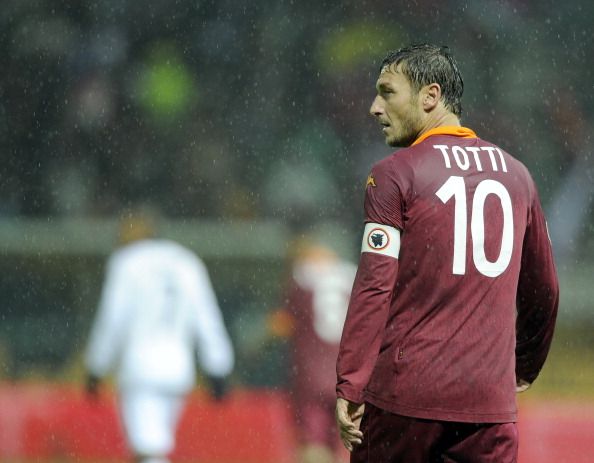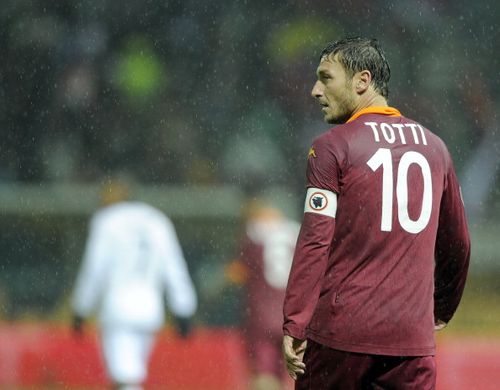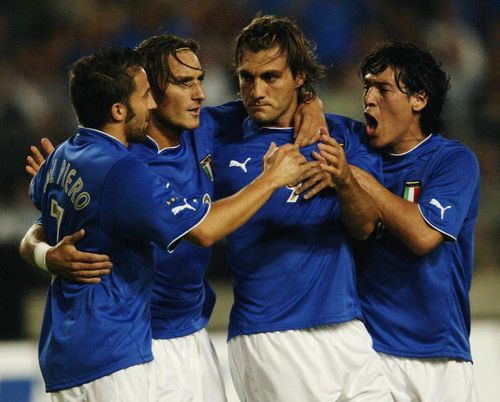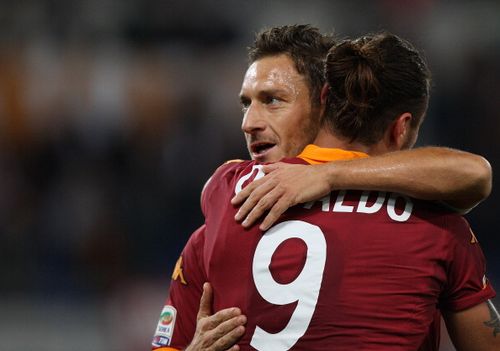
The 10 Most Influential Captains of the Modern Era: Francesco Totti

PARMA, ITALY – OCTOBER 31: Francesco Totti of AS Roma during the Serie A match between Parma FC and AS Roma at Stadio Ennio Tardini on October 31, 2012 in Parma, Italy.
It’s strange that inspite of all the hoopla surrounding the “False 9″, we rarely hear the name “Francesco Totti” being mentioned in the conversation. After all, Totti remains one of the pioneers of the art of the “False 9″, notching up a career high 26 goals in the 2006-07 season under Luciano Spalletti. Playing as a lone striker and dropping deep to collect the ball between the lines, Totti often left opposition centre backs clueless, because they had no one to mark. Most teams had no answer to this revolutionary tactic and in the ensuing chaos, Totti shone. But pulling off a False 9 wasn’t Totti’s only claim to fame. Just another remarkable achievement for an exceptionally gifted individual.
Playmaker, striker, visionary, rebel, problem child, one-club legend – some of the many different shades of Francesco Totti. Since the time he made his debut in 1992, AS Roma, and consequently Totti, has had 16 managers at the club. Perhaps the only constant during that sea of change was Il Bimbo d’Oro (the Golden Boy). The one pivot around which all managers built their Roma teams. And for good reason. Here was a born and bred Roman, a hardworker, someone respected by his teammates and peers, adored by the fans and with a penchant for the spectacular. So for a new manager at Roma, the first task has always been clear: Get Francesco Totti on your side, and the rest will follow.
With 274 goals (all competitions) in 653 games for AS Roma, Totti is the all-time goalscorer and the most capped player in the history of the club. Not surprisingly, he has been captain for 14 years now, ever since taking up the honour in 1998. Most players dream of one day playing for their hometown club, but Totti’s been there and done that.
And then some.
“I agree with Pelé, Totti is the best player in the world. Totti is the history of Roma, the club, and I think that he is an intelligent man. Totti will stay and will close his career with Roma because he cares about the future of club and created a contract that sees him as the player the club will build its image around. I do not see why he should leave Roma. It would be easier to move the Colosseum out of Rome.”
- Luciano Spalletti

STUTTGART – AUGUST 20: Alessandro Del Piero, Francesco Totti, Christian Vieri and Mauro German Camoranesi of Italy celebrate during the International friendly match between Germany and Italy on August 20, 2003 at The Gottlieb Daimler Stadium in Stuttgart, Germany. Italy won the match 1-0.
Unlike other team sports, captaincy in football is an over-rated concept, because it has no real responsibilities. Apart from being the face of the team, the captain might as well be just another player, but with an armband. In most cases, captaincy is a reward for loyalty or a token of gesture for that one true leader of men in the dressing room. The most popular player is always a wise choice for the captaincy, because it means less dissent in the squad. In other cases, the best player at the club is the captain. Again, it makes sense. Lead from the front with your performances, and you will set the bar for the others and automatically gain the respect of your peers. Totti has the unique distinction of being in both camps. Popular? His teammates adore him. The best player in the club? For years.
But the thing most people look for in their captain is that innate ability to set the right course and bring the team together. Nothing lifts a dejected team more than a spark of brilliance from their main man. Because it means there is still hope. Hope can be in the form of a bone-crunching tackle, clearing the ball off the line or scoring a belter from 30 yards out. A club captain is the lighthouse for a team that has lost its way, at least on the pitch. And very few do it better than the Italian. His famous “thumb-sucking” celebration after scoring a goal has been seen umpteen number of times, and more often than not, comes after a goal that has awakened a slumbering side.
After seeing some of his goals, you would be forgiven for thinking Totti is a left-footed player. He is an ambidextrous player, as pure as they come. Clean, crisp, elegant and at times ferocious strikes from either foot. No angle too acute, no distance too long. The Panenka against Edwin Van der Sar in the semifinals of the Euro 2000 penalty shootout exhibited his nerveless, calculated and confident approach to the game.
Only Gigi Riva could kick the ball like him in Italy. But only with his left foot. Totti can use both feet and can hit the ball in several ways. Such champions can shoot ten times per match and eight of them are aimed on target, while five are very dangerous and can turn into a goal. Totti’s shooting qualities are unique and they will stay intact for life
- Fabio Capello
Having a player like Totti also inspires the rest of the team. They know what to expect from the leader, what he is capable of and that he will not accept shirkers in the team. That is what he demands in return for his loyalty to the Roma shirt. Real Madrid might have come calling with lucrative offers, but the steadfast Roman never blinked. There was no question of it. Totti is Roma, through and through.
The other side of the argument is that for all his loyalty to Roma, Totti has one Scudetto title to show for it. No Champions League glory for him, just a solitary league winner’s medal and a World Cup winner’s medal. A poor return, at-least domestically. Fans always want their club legends to achieve success, so that it inspires others to take up the cause. But in Totti’s case, he has always been dragging along an underachieving side. The shortcomings of the team were not because of him, but inspite of him. No matter how talented, one player can only do so much. Totti’s friend and Italy teammate Alessandro Del Piero collected medal after medal at Juventus, while Totti would have to be content with the six Serie A 2nd place finishes.
“Totti is a fantastic player. I am proud to play in a team with a player like him who is the symbol of Roma and that means a lot to the fans of this club. The modern game has changed a lot, but I think it is critical to a club with a player who is much like Totti. Money is important in football, but there are other things of more important value for an entity”
- Pep Guardiola

ROME, ITALY – OCTOBER 28: Francesco Totti (L) with his team-mate Pablo Daniel Osvaldo of AS Roma celebrates the second team’s goal scored by Erik Lamela during the Serie A match between AS Roma and Udinese Calcio at Stadio Olimpico on October 28, 2012 in Rome, Italy.
More than silverware though, it is his unique relationship with the fans that Totti must treasure. It cannot be easy to carry the burden of the team for more than a decade, but Totti does it in style and with a smile. On the streets of Rome, it is commonplace to see a mural of Rome’s legendary son adorning a house wall. Totti often uses matchdays to send across appreciative messages to the fans, so the love and devotion is not a one-way street.
At 36, Totti is in his last few years as a professional footballer, but his love for the game and for the fans is a candle the will never stop burning. He already has a clause in his contract which allows him to be club director, upon retirement. This 5-time Italian footballer of the year has set the bar so high in his playing days that his time as a club director can only disappoint. Not that I am complaining. It will be good to see the Roman milling around the Stadio Olimpico in the years to come, to remind us of the legend he is now.
A captain, star-player, one-man army, staunch Roman, great goalscorer, game-changer – the many different shades of Francesco Totti. As influential a captain as they come.
Because I grew up playing for Roma and I want to die playing for Roma, because I have always been a Roma fan!
- Totti, when asked why he never moved to another team.
Catch the rest of this series here: The 10 most influential captains of the modern era